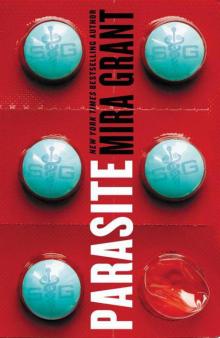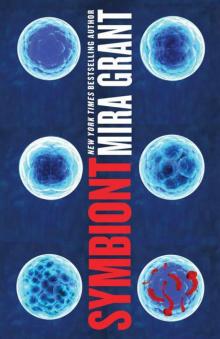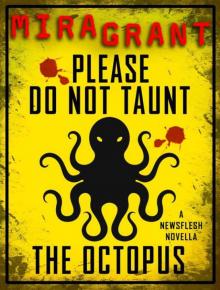- Home
- Grant, Mira
Parasite (Parasitology) Page 11
Parasite (Parasitology) Read online
Page 11
“Oh, same old, same old. Got a date with Chuck from Accounting on Friday night, he’s always good for a laugh, and then I’m taking Laura from the steno pool out on Saturday night. She’s not much of a laugher, but Christ on a crutch, that girl can kiss like it’s an Olympic sport. How about you?”
“Nothing so exciting,” said Dr. Lo, and slid her needle into my arm, taping it firmly in place. “Sally, don’t move.”
“Yes, Dr. Lo,” I said.
She continued as if I hadn’t spoken, asking, “Does Chuck know about Laura? And you do know that no one calls the admins the ‘steno pool’ anymore, don’t you? I’m not even sure what that means.”
“It’s short for ‘stenography pool,’ ” I said, before I thought better of getting involved. I wasn’t supposed to be a participant in this conversation. Furniture, even furniture that somehow magically gave blood, wasn’t supposed to talk. “Stenographers used shorthand to take notes before dictation machines and personal computers were in wide use, and… uh…” I tapered off, finally realizing that Dr. Lo was staring. “Sorry.”
“I taught her that one,” said Sherman, with every indication of pride. “And yeah, Chuck knows about Laura. He doesn’t care much, thinks he can convince me that the girly side of the force isn’t worth chasing after. As for Laura, she’s up for anything that comes with a side order of good times and doesn’t stiff her with the bill.”
“You are a tomcat, and one of these days, it’s going to get you hurt,” said Dr. Lo—but she was laughing, my interjection apparently forgotten. She reached for the tubing that she would use to actually direct my blood where she wanted it to go. “I was talking to Michelle from Radiology, and she said…”
Her voice seemed to trail off as I focused on the deep red color of the blood that was filling her feeder vials, pressing itself against the glass. My veins felt tight and swollen, like their contents couldn’t wait to escape from my body and experience the freedom of the open air. My breathing evened out, more sounds dropping away, until all that I could see was the red, and all that I could hear was the whisper of air passing through my nose and mouth. I let my eyes slip closed. The red remained, somehow brighter against the black. The sound of my breathing faded, replaced by the distant, steady drumbeat of my heart.
Then I slipped further into the red, and I was gone, drowning in the drums.
“Come on, then, Sal.” Sherman’s hand gripped my shoulder firmly enough to get my attention, although not firmly enough to hurt. “Time to wake up and move on.”
“Wha’?” I sat upright, only to slump again as the movement made my head start spinning. I was still in the chair in Dr. Lo’s phlebotomy lab, but Dr. Lo was gone. The only sign of her that remained was the cotton ball taped to the inside of my right elbow, dotted at the center with a spot of vivid red. Some of my blood had managed to escape after all. The rest was away with the doctor, bound for labs and exam rooms, never to be free again.
“You know, the first time you did that, I really thought you’d just gone a little overboard with the fasting. Now I realize the truth, and it’s no less bizarre. You are the only person I have ever met who can go to sleep during a blood draw, you know that? It’s like the world’s weirdest useless talent.”
“It’s relaxing,” I said, and levered myself out of the chair. My head was still spinning. I pressed a hand against my temple, trying to get the room to hold still for a moment, or at least spin more slowly. “Is there juice? I think I’m going to fall over. Or throw up. Or possibly some combination of the two.”
“There’s juice and cookies. Sit back down and I’ll fetch them for you.” Sherman pushed me gently downward before turning to bustle toward the room’s small refrigerator. There was also a large refrigerator, but it was filled with blood and tissue samples, not safe things like juice boxes for lab rats. Sherman even managed to make a bustle look elegant. That was enough to make me giggle, as I wilted there in the chair and waited for him to come back.
Sherman looked over his shoulder at me. “Here, now. You making fun?”
“Maybe a little,” I admitted, holding my thumb and index finger about a quarter of an inch apart, to show him just how little.
“Good. Means you’re feeling better.” He came back with a bottle of cranberry juice and a package of strawberry Fig Newtons. My favorite. “Drink this, eat these, and don’t complain about either. We’re going to go give a urine sample to the boys in the next lab after this, and then it’s almost time for your visit to Accounting. Don’t worry, though, you’ll have a lovely barium treat before that.”
“Is it cranberry flavored?” I asked, and sipped my juice. Sweetness exploded on my tongue. That was never a good sign. Like Gatorade, the better cranberry juice tastes, the more you need it.
“No, I’m pretty sure it’s barium flavored. At least you’re contributing to the greater cause of science by downing the stuff, eh, pet?”
“Good for me.” I opened the cookies. Then I paused. “Am I allowed to eat these before the barium?”
“Yes. Better a bit of imaging skew than a lot of vomiting barium on everyone’s shoes. Besides, this is all a formality. Now eat up.”
That was all the permission I needed. Sherman stood by while I drank the rest of my juice and stuffed cookies into my face. The room slowly stopped its spin. I wasn’t back to normal—blood sugar doesn’t bounce back that fast—but I was close enough to pick up my bag and get out of the chair without pitching forward onto the floor. Sherman still moved to take my arm, steadying me until he was sure I wasn’t going to fall. He didn’t let go. Instead, he looked quickly around, like he was checking to see if we would be overheard.
Once he was sure that we were alone, or as alone as it was possible to be in the bowels of SymboGen, he leaned closer, and murmured, “You’ve got to stop dozing off during tests that are supposed to be upsetting, Sal. It’s not normal, and you and I both know they’re watching you for signs of not normal. You don’t want to give them the ammunition that they need.”
I blinked at him, feeling that old familiar alarm beginning to coil around my spine. “The ammunition that they need for what? I thought we already determined that I was just unnaturally relaxed, not suffering from low blood pressure or a fainting disorder.”
Sherman didn’t say anything. He just sighed and let go of my arm, turning to start toward the door back to the hall. After a moment’s indecision, I followed him. Sherman was one of the closest things I had to a friend at SymboGen, but the company was still his employer, while I was a girl who should never have been allowed behind the wheel of a car. If it came down to them or me, his loyalty was already given.
The normal swirl of medical and laboratory personnel filled the hallway, their greetings and chatter making further conversation impossible. Sherman had probably timed it that way, to avoid me asking any more awkward questions. I dogged along at his heels, hugging my bag against my chest, until we reached the next lab, where I was handed a plastic cup by a technician I’d never seen before and directed, firmly, to the nearest bathroom. Very firmly: Sherman led me there and pushed me inside before closing the door behind me.
It’s funny: for a company that made its fortune off a genetically modified tapeworm, the people at SymboGen could be awfully prudish about basic bodily functions. The first few times I had to take a urine test after they took out my catheters, I just dropped my pants and filled the cup right in the middle of the lab. I stopped doing that once it was explained to me why it was inappropriate, but they still acted like there was a chance I might start peeing on everything the first opportunity I got. They were the ones who asked for the urine sample. It’s not like I volunteered it.
There are times when I truly regret not remembering my childhood and the normal human socialization that I have to assume came with it. There are other times when I am frankly glad to be free of all the baggage. Everybody pees, especially when they’re ordered to do so by lab techs.
As soon as the cup was full
to the line on the side, I capped it firmly and placed it in the small alcove designed for that specific purpose. Apparently, urine was viewed as so powerful that it could even contaminate shelves through plastic if not properly contained. Once that was safely done, I washed and sanitized my hands before knocking on the bathroom door. “You can let me out now,” I said. “I’m done.”
“Are you quite sure?” asked Sherman. I was relieved to hear the teasing note in his voice. I was forgiven for pushing him before. “Maybe you’re still intending to have yourself an extracurricular widdle.”
“Widdle?” I asked, laughing. “Oh, you so made that one up.”
“Don’t test me,” he recommended, and opened the bathroom door. As in Dr. Lo’s lab, the technician had vanished. Sherman saw me looking around for him and clapped a hand down on my shoulder. “Paul couldn’t abide your radiance, my dear. He fled before he could be blinded.”
I sighed. “The new guys still think I’m a freak of nature, huh?”
“To be charitable, Sal, you are a freak of nature. You survived the unsurvivable, you recovered from the unrecoverable, and you fall asleep when you’re having blood drawn. People who don’t know you like the rest of us do just don’t have a frame of reference for you, that’s all. And they have work to do. Your appearance is good for hours of overtime.”
“Shouldn’t that come with a little light conversation?”
“You’ve come a long way in your understanding of human nature,” said Sherman. “You’ve farther yet to travel. Including, if my memory serves me right, down the hall to the radiology lab. Let’s fill you up with delicious barium, shall we?”
“You’re so good to me,” I said sourly, and followed him back into the hall. Just another day at SymboGen, where there’s no test too small, or too invasive, to run on a captive audience.
Extreme precautions are required when attempting to raise D. symbogenesis outside its natural human host. Modern Intestinal Bodyguards™ never exist outside the digestive systems of the people who willingly ingest them in pill form. Consequentially, they have been keyed to respond to specific environmental cues, and will only develop properly when those cues are present in their environment.
This makes D. symbogenesis both easy to control and difficult to study, due to the worm’s tendency to die as soon as it is removed from the biological safety of its human host…
—FROM “THE DEVELOPMENT AND LIFE CYCLE OF DIPHYLLOBOTHRIUM SYMBOGENESIS,” ORIGINALLY PUBLISHED IN THE STANFORD SCIENCE REVIEW, JUNE 2017.
In an ironic side effect of the Intestinal Bodyguard™ being used for so much day-to-day medical care, people became very cautious about antiparasitic drugs. Several otherwise popular medicines were removed from the market once it became clear that they could damage the implants, and even casual drug users tended to steer clear of things that could harm their resident worms. No one wanted to kill the goose that laid the golden eggs. People were even more reluctant to kill the worm that kept them healthy.
—FROM SELLING THE UNSELLABLE: AMERICAN ADVERTISING THROUGH THE YEARS, BY MORGAN DEMPSEY, PUBLISHED 2026.
Chapter 7
AUGUST 2027
Sherman passed me off to Chave, who dragged me to the accounting department to be grilled about my receipts, which looked exactly like every other batch of receipts I’d ever brought in for them to review. Medications, vitamins, physical therapy sessions, the usual. The only thing that actually should have caught their attention was the bill for a new grain heating pad—technically a “household item,” and thus a questionable expense—but they waved it off without comment, choosing to focus instead on the number of times I’d been to see the chiropractor since my last visit.
Eventually, they freed me back into the halls of SymboGen, and Chave delivered me back to Sherman, who was flirting with a receptionist I didn’t recognize. The receptionist pouted when Chave called Sherman away, but hid the expression quickly. Smart. I wouldn’t have wanted to attract Chave’s attention when I didn’t have to.
“She’s all yours,” said Chave, waving me toward Sherman. “Get her an ultrasound and make sure she’s in the cafeteria at one. Beyond that, I don’t care what you do.” Then she turned and stalked away.
Sherman watched her leave, waiting until she was out of earshot before sighing longingly. “That, my darling Sal, is a woman who needs an infusion of fun in her life. Possibly accompanied by a pitcher or two of strawberry mojitos.” He clucked his tongue. “Anyone that tightly wound is going to be a tornado when they finally let go. Imagine being the lucky bloke—or bird—on the receiving end of that storm warning.”
“I think we have very different ideas of what makes a fun evening,” I said.
“Probably so,” Sherman agreed, and turned to lead me back toward the elevator. “Have a good day so far?”
“No worse than usual, and I guess I’ll call that a win.” I sighed. “I just keep reminding myself that I don’t have to do this again for six months. It helps me get through the day.”
“That’s good.” The elevator doors slid open. Sherman waited until they closed again before saying, casually, “Word is that Banks is trying to hire you on for the research department. Can’t imagine you’d be too thrilled about that.”
I stared at him. “Just how good is the rumor mill around here? We only talked about that a few hours ago.”
“Nothing happens in a vacuum, especially not when you’re talking about a company this size.” Sherman looked at me thoughtfully. “Are you going to take it? You’d be around here a good bit more. But you wouldn’t have to worry anymore about whether you’d have another emergency. It might take a bit of the edge off.”
“Yeah, and I’d be on site when I cracked from the pressure of all those eyes looking at me all the time. That would make it so much easier for them to get me into a nice padded room.” The elevator dinged, signaling our safe return to the subterranean domain of the scientists. “I’d rather worry a little now than freak out a lot later on.”
“That’s what I thought you’d say,” said Sherman, and stepped out of the elevator. I followed him, and together we made our way to the dressing room outside the ultrasound lab. “You get changed; I’ll go make sure the science mooks are ready for us.”
“You got it,” I said, and slipped inside.
The ultrasound machine surrounded me like a huge, comforting hand, holding just tightly enough that I didn’t need to be afraid that I would somehow lose my grip on the surface of the world—that gravity would fail or an earthquake would mysteriously flip the building upside down and send me plummeting into empty space. I could move, to a degree, crossing or uncrossing my arms and ankles, but for the most part, I was safely confined. I raised one hand to check that my rebreather was solidly in place, and closed my eyes.
Some people apparently found full-body ultrasounds invasive and claustrophobic, and would go to any lengths to avoid them. I had the opposite response. If I’d been able to trade all my other tests for additional time in the ultrasound chamber, I would happily have done so. According to Sherman, that was one more reason for the company technicians to view me as a freak of nature.
The full-body imaging department at SymboGen consisted of two different sections: the MRI room and the gel ultrasound room. I had undergone both at one time or another during my visits to SymboGen, and the gel ultrasound was definitely my favorite of the two. MRIs meant lying on my back for up to an hour while the machine took its snapshot images of my body, trying not to move as my weight seemed to press me deeper and deeper into the metal bed. There was no padding in an MRI tube; that might interfere with the readings.
People who found MRIs claustrophobic apparently freaked out completely during gel ultrasounds, which required a rebreather and that the subject’s eyes remain closed for the duration. The techs would even glue them shut for you if you asked them to, to make sure you wouldn’t give in to the urge to look around and see what was happening. After you were fully prepped and inside the tu
be, it was flooded with a bioresponsive plastic gel modeled off the biological structure of slime mold. It was hypoallergenic, nontoxic, and as harmless as possible.
Gel ultrasounds were infinitely more comforting than MRIs. I relaxed, slowing my breathing as I allowed myself to go totally limp.
There was a clicking noise in my left ear just before the head technician’s voice came through the side of my rebreather: “You ready for us, Sally? Clench your left hand for ‘yes.’ ”
I obediently clenched my left hand. I liked the ultrasound technicians. They were nice, although they treated me with an odd reverence. I had asked Sherman why that was once, after a particularly relaxing session in the ultrasound chamber. He’d laughed and replied, “Because, my sweet Sal, you are the only person ever to fall asleep in their gooey torture chamber. They think you’re either bloody insane, or that you’ve got balls the size of boulders.”
“What do you think?” I’d asked.
“I think it’s a little bit of both.”
I smiled around my rebreather at the memory, and allowed the last bit of tension to seep out of me as the ultrasound whirred to humming, buzzing life. My breathing slowed further once the humming began. The sound set up minute vibrations through the liquid, faint enough that they didn’t interfere with the machine’s readings, but strong enough for me to feel them eddying against my skin. It was like being at the center of my own private tide pool.
At some point, I drifted away, down into the dark, which reached up to claim me like a lover, folding itself around me and pulling me into itself. I didn’t fight. I was safe, I was surrounded and safe, and nothing was ever going to hurt me again.
I didn’t dream. Not there in the ultrasound tube, with the warm gel buoying me up and the sound of the machine lapping against my skin. Instead, I just drifted, and dozed, and let the world pass by around me.
It was gravity that brought me back: the strangely wrenching sensation of gravity reasserting itself as the gel began draining out of the ultrasound tube and my body settled down onto the hard metal bed of the machine. I managed not to start squirming, but it was hard. This was always the tricky part, keeping still until I was given the clearance to start moving again. Move too soon, and I risked either dislodging my rebreather and giving myself a lungful of plastic gel, or opening my eyes and getting an eyeful of the stuff instead. It wouldn’t actually hurt me, but it could make breathing—and seeing—remarkably uncomfortable for a short period of time.

 How Green This Land, How Blue This Sea: A Newsflesh Novella
How Green This Land, How Blue This Sea: A Newsflesh Novella Parasite (Parasitology)
Parasite (Parasitology) Symbiont (Parasitology Book 2)
Symbiont (Parasitology Book 2) Please Do Not Taunt the Octopus
Please Do Not Taunt the Octopus